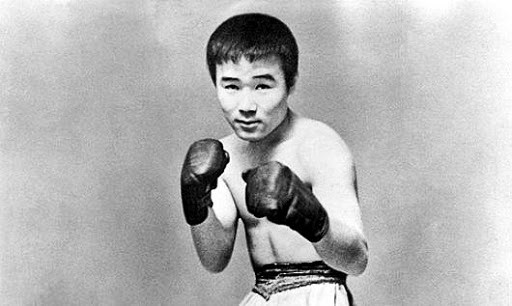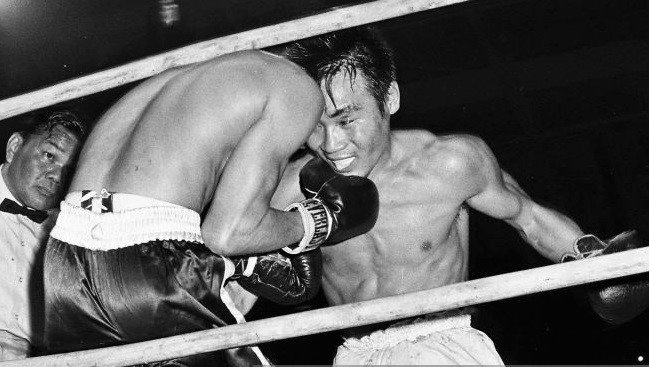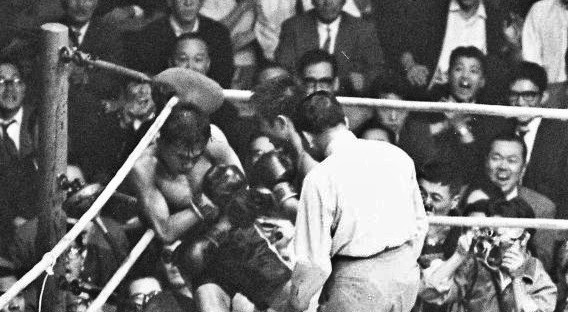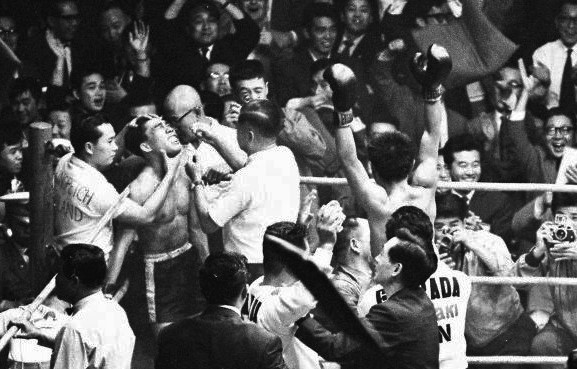rewrite this content and keep HTML tags
Pone Kingpetch, Thailand’s first world champion, had won the flyweight crown from Pascual Pérez, an impressive achievement considering the Argentinian is without a doubt one of the finest flyweights of all-time. After annexing the crown, Kingpetch, whose real name was Mana Seedokbuab, then won five in a row, including a rematch victory over Pérez and title defenses against Mitsunori Seki and Kyo Noguchi. All agreed, the new king of the flyweights was a crafty sharp-shooter who looked to have the stuff to rule over the division for some time to come. And so all agreed as well that Japan’s Masahiko Harada, better known as “Fighting Harada,” while aggressive and strong, was too green and too crude to take the title from such a clever operator. Successful title defense number four for Kingpetch, coming up.
But what no one could know at the time was that Fighting Harada was a very special talent indeed, a gutsy warrior who would prove himself arguably the best boxer to ever emerge from Japan. However, the stocky and powerful Harada was not long for the flyweights and it was in the bantamweight division where he would go on to establish himself as an all-time great with wins over José Medel and Eder Jofre. But this was all still to come. In 1962, at just nineteen years of age, Harada represented little threat to Kingpetch. Or so the pundits thought.
But from the opening bell, the young challenger fearlessly took the fight to Kingpetch, setting a furious pace and constantly winging vicious shots like a Japanese version of “Hurricane” Henry Armstrong. While the match took place in a standard-sized ring, and Kingpetch had ample room to maneuver, a phone booth might have served as well, with Harada relentlessly pressuring the taller man, closing the distance and unleashing two-fisted attacks, his right hand, fired as if spring-loaded, finding the target again and again. To everyone’s surprise, the first round was all Harada.

The champion worked to regain the initiative in round two and keep the action in ring center, but any success was short-lived. Midway through the round Kingpetch found himself trapped in a corner and bombarded with heavy blows before he managed to clinch, and near the end of the round the fury of Harada’s onslaught had him careening off the ropes. The challenger was setting up his vicious sorties with clever head and upper body movement and a busy jab, consistently beating Kingpetch to the punch and keeping him guessing as to where the next power shot would be coming from.
Rounds three and four were much the same. Harada, bouncing on the balls of his feet, would flick out quick jabs as he came forward and then abruptly unleash heavy blows, either with the left hook or a looping lead right that Kingpetch failed to anticipate again and again. It didn’t help that the taller champion preferred to keep his left hand low so he could spear with the jab from mid-range. As a result, Harada continued to find the target with that damaging right hand bomb.

By the fifth it was evident the blistering pace and non-stop pressure were taking their toll on Kingpetch, while Harada looked as fresh as ever, leaping from his stool at the start of each round and actually sprinting to rejoin the fray. He was now clearly the stronger of the two and physical strength, non-stop aggression and raw power were the terms Harada had set. Round six saw the challenger, like an unstoppable force of nature, landing one powerful right after another before seriously hurting Kingpetch with a left hook. The follow-up barrage was so furious it brought the crowd to its feet and forced the champion to hold on to survive.
In the seventh the pace slowed and the champion used the brief respite to hold his own with jabs and straight rights, but near round’s end Harada abruptly opened up with both fists, the fury of his assault driving Kingpetch from one side of the ring to the other. That proved to be the last round for which one could say the match was at all competitive as in the eighth the contest became a one-sided mugging, the crowd coming alive as Harada appeared on the verge of a stoppage win. The Thai had no answer to the challenger’s aggression as he repeatedly found himself bulled to the ropes and mauled, and a series of hard left hands had him on shaky pins at the end of the round.

A weary-looking champion was slow to rise from his stool at the bell for round nine, but he fought back courageously, briefly going into the trenches with his tireless opponent and trading on the inside. But soon enough the prevailing pattern of the struggle returned with the ferocious Harada chasing Kingpetch about the ring and landing heavy blows, the crowd roaring now with every clean punch from the irrepressible challenger. How much more discouraged Kingpetch must have felt when near the end of the round he timed Harada and landed perhaps his best punch of the entire bout, a clean right to the jaw, and nothing happened. On top of everything else, this determined Japanese warrior had a chin as hard as his fists.
The fans at the Kuramae Kokugikan Arena were greeted with a curious sight when the bell rang for round ten, as Harada sprinted across the ring to confront an opponent who was still sitting on his stool. The referee allowed the champion a few extra seconds to finally stand and when the battle resumed Harada pounced on his foe like a man possessed, unleashing a torrent of non-stop blows to both body and head. Exhibiting incredible stamina, the challenger continued to set a ferocious pace, giving Kingpetch virtually no chance to set himself or regroup. A right hand buckled the Thai’s legs and he bravely fought back but he was working now strictly to keep Harada at bay and survive.

In round eleven what had appeared inevitable since the eighth finally happened. Harada, still bouncing on those inexhaustible legs of his, stunned Kingpetch with a pair of thunderous rights and then trapped the champion in his own corner and unleashed a ceaseless torrent of blows, many landing flush. Only the turnbuckle prevented the overwhelmed champion from falling and as he slowly sank down the referee ruled a knockdown and started the count. Exhausted and battered, Kingpetch never came close to rising. In a huge upset, Fighting Harada had won the world flyweight title with a clean knockout of the man who had conquered Pérez, the clever boxer that all thought too sharp and too good for a 19-year-old unknown. Now Japan had a new world champion, a indomitable punching machine who reminded the old-timers of Stanley Ketchel and Henry Armstrong.

Given the one-sided nature of the Harada vs Kingpetch battle, few, if any, would have predicted that Kingpetch could ever reverse the outcome, but three months later in Thailand that’s exactly what he did, winning a majority decision over a seemingly listless Harada. Soon after, Japan’s new favorite fighter moved up to the bantamweight division, where he would win his second world title and defeat the legendary Éder Jofre, not once, but twice. — Robert Portis





















